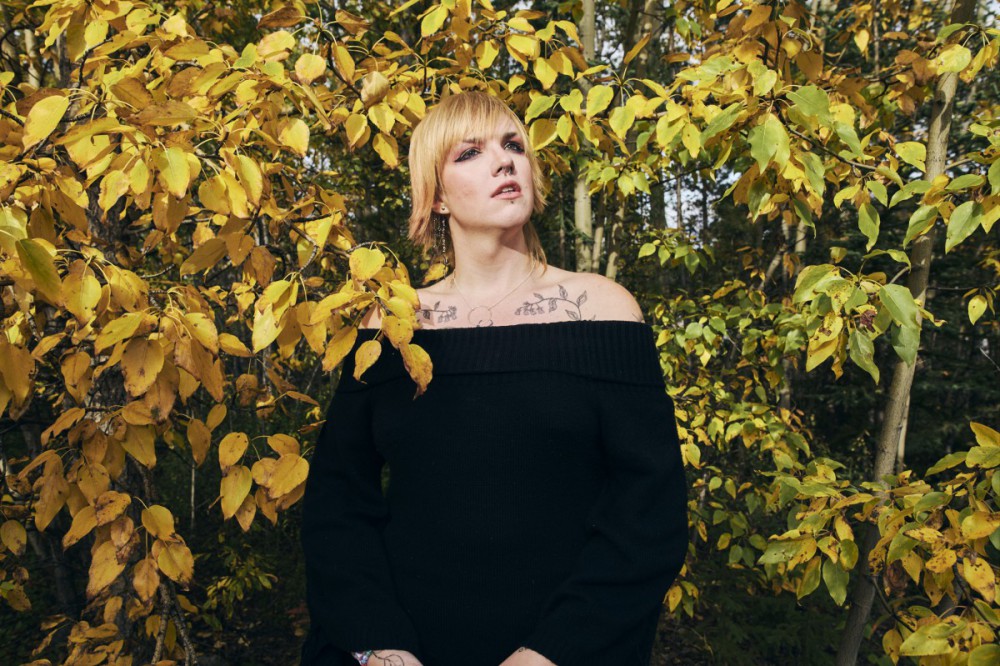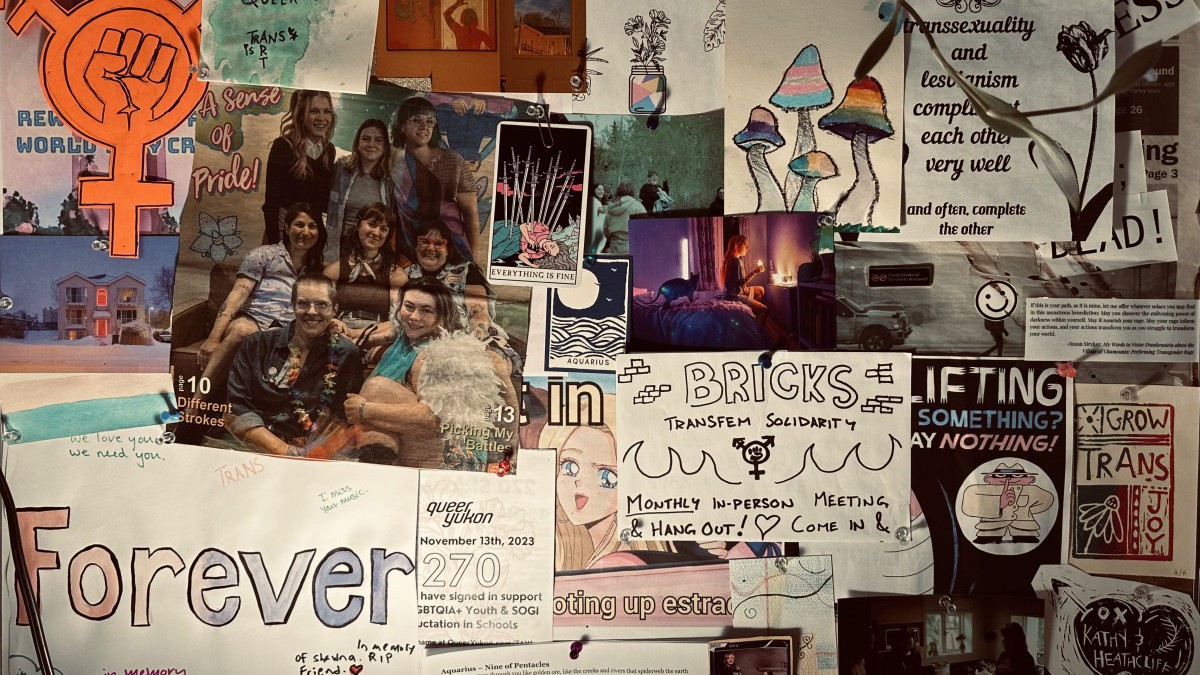On February 14, 2025, Queer Yukon Society (QYS) signed its first collective agreement. As an organization that promotes, supports, and organizes events for the 2SLGBTQIA+ community in the Yukon, it was important for QYS workers, along with their union, the Public Service Alliance of Canada (PSAC) and its component, the Yukon Employees’ Union (YEU) to fight for some immense wins such as sick leave for gender-affirming care, Indigenous-led alternative dispute resolution, and the right for workers to participate in social justice movements.
Mirabel Sirois
Paige Galette
When the team began the bargaining process, I had started with a self-imposed limitation of what I thought we could ask for, but the more we discussed our workplace issues, I started asking myself “well, how far can we go?”
Mira S.
I'm proud of the work we did. Our bargaining team was exceptional – my co-workers including Austria Lopez, the community engagement coordinator for Watson Lake, along with our PSAC negotiator Erna Post and of course you, Paige. Mixed in with my pride is a curiosity to see the collective agreement’s enactment and how it can serve as an example for other workplaces.
The negotiating process was really illuminating for us as a group of radical people trying to translate our values into a legal framework. This exercise had us understanding what is possible within the framework of labour law. Erna was a great negotiator. She allowed us to have endless conversations as a team before getting to the table with the employer and she was able to help us figure out what was possible from the union’s perspective. I think we did an excellent job of moving past asking for the bare minimum, while pushing forward as far as we could. Our goal was to protect what we had, prior to unionizing, while also creating protections for things we had yet to experience.
When the team began the bargaining process, I had started with a self-imposed limitation of what I thought we could ask for, but the more we discussed our workplace issues, I started asking myself “well, how far can we go?” I think that is the sentiment I want to take forward and leave for whoever comes next – push until you hit a barrier. If you can blow past that barrier, blow past it, but never put barriers in front of you before the employer does!
How are you feeling, now that the collective agreement has been signed?
Paige G.
I'm definitely feeling proud. This was three years of thoughtful care and intentions.
I've been advocating for a “for us, by us” model in unions. This experience was the first time I had the opportunity to see it actualized. Our bargaining table in its representation alone, was revolutionary – all members are queer, trans and for some, racialized.
Like you, I’m excited to see how the articles we debated will be put into practice, how the collective agreement will evolve in future negotiations, and the precedent this collective agreement sets for all workplaces.
Sick leave and gender-affirming care
Paige G.
Talk to me about pushing for the inclusion of paid time off for gender-affirming care and psychological health care in the sick leave policy.
Mira S.
I think the sick leave policy was one of our biggest wins.
I have had to go on extended leave to accommodate recovery times for gender-affirming care (GAC). Anyone who has gone through a major surgery knows it puts you out for a long time and is costly.
There are costs associated with GAC that are not covered by the Yukon government. To access GAC, one must travel out of territory. The Yukon government’s medical travel program covers up to a certain amount but it's inadequate. The program reimburses a small fraction of the costs and doesn't account for food, medical recovery supplies, prescription medications, bed pads, gauze, abdominal compression underwear, compression binders for top surgery, and other essentials for a good recovery.
In my experience, workplace policies on sick leave are never enough to accommodate the worker. Banked sick leave has its limits. My first GAC intervention was a two month minimum, three month recommended time away from work. I had saved up as much sick and vacation leave as possible and it still only covered one out of the two months. I should not have gone back to work at the end of the second month, but I had to.
And having depleted my vacation and sick leave, I was stressed about getting sick and having exhausted all my leave. This new policy both accommodates the time needed to recover and also stipulates that the worker will have their sick leave regenerated instantly. This is a massive win!
As workers, we should not be in a precarious financial situation, nor have to choose between having sick leave or gender – and therefore, life – affirming care. I hope that many of us learned through COVID-19 that coming to the workplace sick is a risk and safety issue for everyone.
Solidarity and equity
Mira S.
I'm curious if you can share your process in drafting the article on equity and diversity in the workplace.
Paige G.
As the regional organizer, I wanted mentorship for union negotiations. Erna (PSAC negotiator) supported my learning by tasking me with drafting the employment equity article. At first I thought, “Oh yeah, that makes sense. I am a consultant and community educator on the subject matter. My work and activism is rooted in practices of equity.” I had to check myself.
My first instinct was to research workplaces similar in queer focus and organizational practice to QYS for their equity statements and policies. I also looked at universities and student unions as I believed them to be spaces that tend to push further than the trend. Their statements seemed empty and inadequate for what I thought would resonate with the bargaining team as well as with Yukon’s queer and trans communities.
Our bargaining dates coincided with the 50th anniversary of drafting of the document “Together Today for Our Children Tomorrow” which pushed the federal government to negotiate a modern-day treaty. The 50th anniversary commemorated the journey to Ottawa taken by the Yukon First Nations delegation – leaders whose vision and determination have had an unprecedented and immeasurable impact on the lives of Yukon First Nations and Yukoners alike.
In crafting and negotiating this collective agreement, the bargaining team’s focus was to have protections and rights in which queer and trans workers are made whole and able to come into their workplace as their full selves – which includes their activism.
The work of these visionaries was instrumental in drafting this article as it had me thinking of equity beyond mere statements or written policy. Because of the document, “Together Today for Our Children Tomorrow,” we incorporated local context into a workplace through land recognition and the Indigenous-led dispute resolution mechanisms. In the end, and in negotiating with the employer, we collectively drew from action plans drafted by various Yukon groups – such as the Calls to Action of the Truth and Reconciliation Commission and the Yukon government’s plan for LGBTQ2S+ inclusion – and named them in page two of our collective agreement as a way to demonstrate the various models of equity at a territorial and national level that the union and the employer seek to emulate and draw examples from.
Mira S.
In Article 38 (on workplace equity) we make reference to multiple action plans to enable employees to point to the employer’s written commitment to provide support and resources for employee-led efforts to align the work of QYS to Indigenous-led calls to action on a national and territorial level. In this spirit, we wanted to enshrine within the collective agreement reference to “Together Today for our Children Tomorrow,” the Calls to Action of the Truth and Reconciliation Commission, the Calls for Justice of the Missing and Murdered Indigenous Women and Girls Commission, the Yukon’s Missing and Murdered Indigenous Women, Girls, and Two Spirit+ People, and more. I am proud that our team fought for the inclusion of these groundbreaking documents.
Paige G.
Those are really good points. Referencing those action plans forces management, workers, and the union to familiarize themselves with them to fully comprehend the intent and implementation of this article in the collective agreement. In a way, the collective agreement serves as an archive for action plans.
Our safety in the workplace
Paige G.
As queer, trans, racialized, and marginalized people, we are never made whole in our workplaces. We're always asked to check our identities at the door. In crafting and negotiating this collective agreement, the bargaining team’s focus was to have protections and rights in which queer and trans workers are made whole and able to come into their workplace as their full selves – which includes their activism.
Art is always up for interpretation but it is never made in a void; it is never made without intent. I think that's similar for this collective agreement. I think that context is important: who put it together, what work has influenced it, what history that led to it, and so on.
Mira S.
There's been a lot of solidarity actions for a free Palestine in the past year and many queer organizations are struggling to do something beyond a simple statement as many actions could jeopardize their funding. It feels contradictory to work for an organization where you don't feel like your values align. Article 11 of the collective agreement “No Discrimination, on political belief, political association, or political activity,” can allow for the protection of someone acting in solidarity of Palestine, or in solidarity of queer and trans experiences, etc. But it could also allow for people to potentially argue that they're in solidarity with far-right values, that are, in essence, hate speech. My fear is how the language of no discrimination could be turned against us.
Paige G.
There are so many ways that I find the right is able to twist things. The left works tirelessly to fight for rights, dignity, and freedoms, whereas the right works to remove and rescind them. The openness of the left in fighting for rights, dignity, and freedom opens the opportunity for our language and movements to be co-opted.
There's always the risk that the collective agreement could be used in bad faith. But I sleep well because I know that the collective agreement we negotiated is giving the workers the space to make a decision on how much of themself they want to reveal at work, and hopefully we, in some way, allowed those folks to also come to work as their whole selves.
Mobilizing now and for the future
Paige G.
Do you think the bargaining team’s intent of creating solidarity across social justice movements, protecting queer and trans’ workers’ rights, and archiving action plans mentioned previously, is apparent?
Mira S.
I hope it is! When you look at a piece of art, you typically have the artist's name, bio, and statement to contextualize the piece. However, without that context, there's going to be a lot you won't understand. Art is always up for interpretation but it is never made in a void; it is never made without intent. I think that's similar for this collective agreement. I think that context is important: who put it together, what work has influenced it, what history that led to it, and so on. I hope that when people look at the collective agreement, they'll see the organization that it came from and they'll see the people who helped create it. People may look at it and interpret it differently than intended but we can't control that. At the end of the day, I know that the intent of the document is good.
I’m curious to see what issues of contention will come up in the day-to-day implementation of the articles in the collective agreement. In its use, we will learn about how it can be improved and how to push it further in future years.
Paige G.
I agree; collective agreements are not static. They have expiry dates and are meant to be amended and polished. What we’ve achieved with this collective agreement can set a precedent for organizing queer and trans workers across the country.
Celebration and reflection
Paige G.
As a union organizer, it isn’t often that collectively, we celebrate, debrief, and examine our wins of the first collective agreement. Union organizing, similar to many social justice movements, is fast-paced and organizers often have this idea of moving on to the “next one.” I'm happy that you and I can be in conversation today and that you're proud of the work that was done despite these moments of turbulence and change for the organization and attacks on the existence of queer and trans people.
Mira S.
Something I struggle with in doing this work is feeling like everything is an emergency. Sometimes it is and we’re fighting for rights that are long overdue. It’s complicated though because thoughtful work takes time but we are often not given that time. We often fault ourselves for not doing this work faster but we need to remember the arc of history is long. Slow work is important – doing things thoughtfully with care; having the conversations that need to be had to make sure we can be proud of what comes together; and reflecting on and celebrating our wins together.
I likely won’t be around to see trans liberation but I need to remember that it's not just for me; it's for the collective, it's for the children. We are the trans elders for the new generations of queer and trans youth and then they can carry on our work and be those elders for the next generation. That's that legacy of the work. That's the impact.



